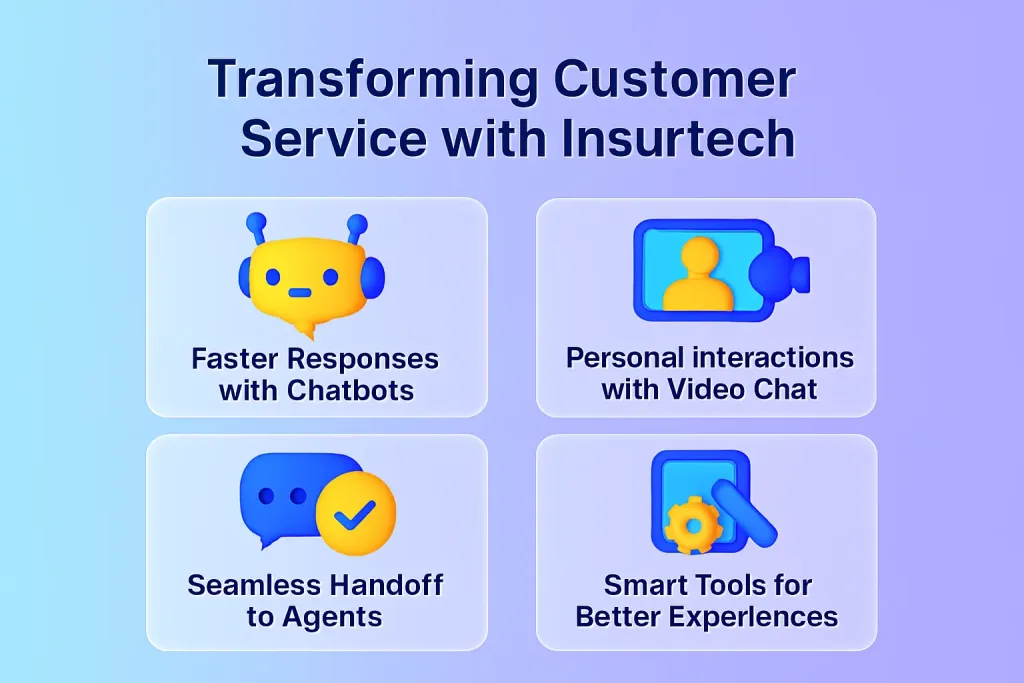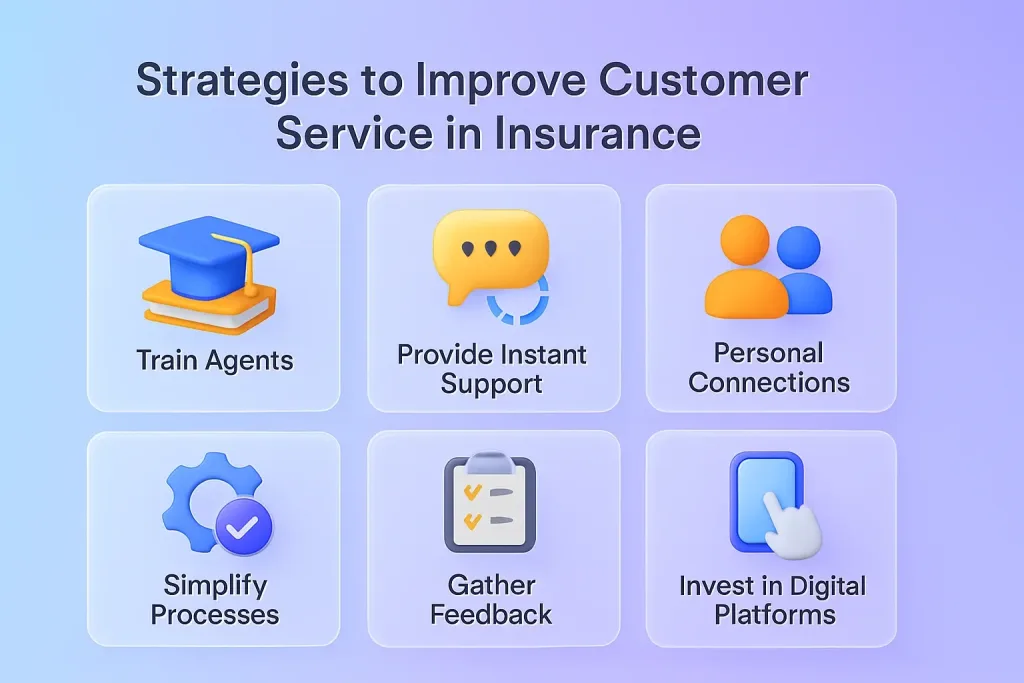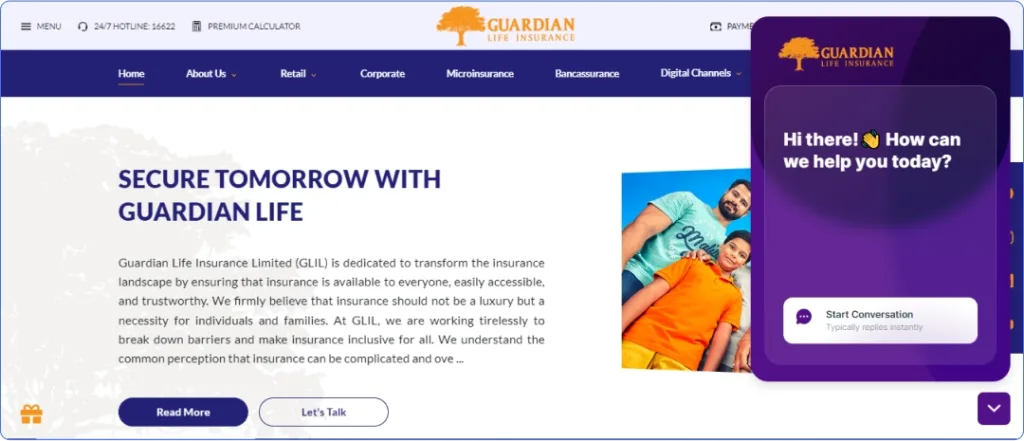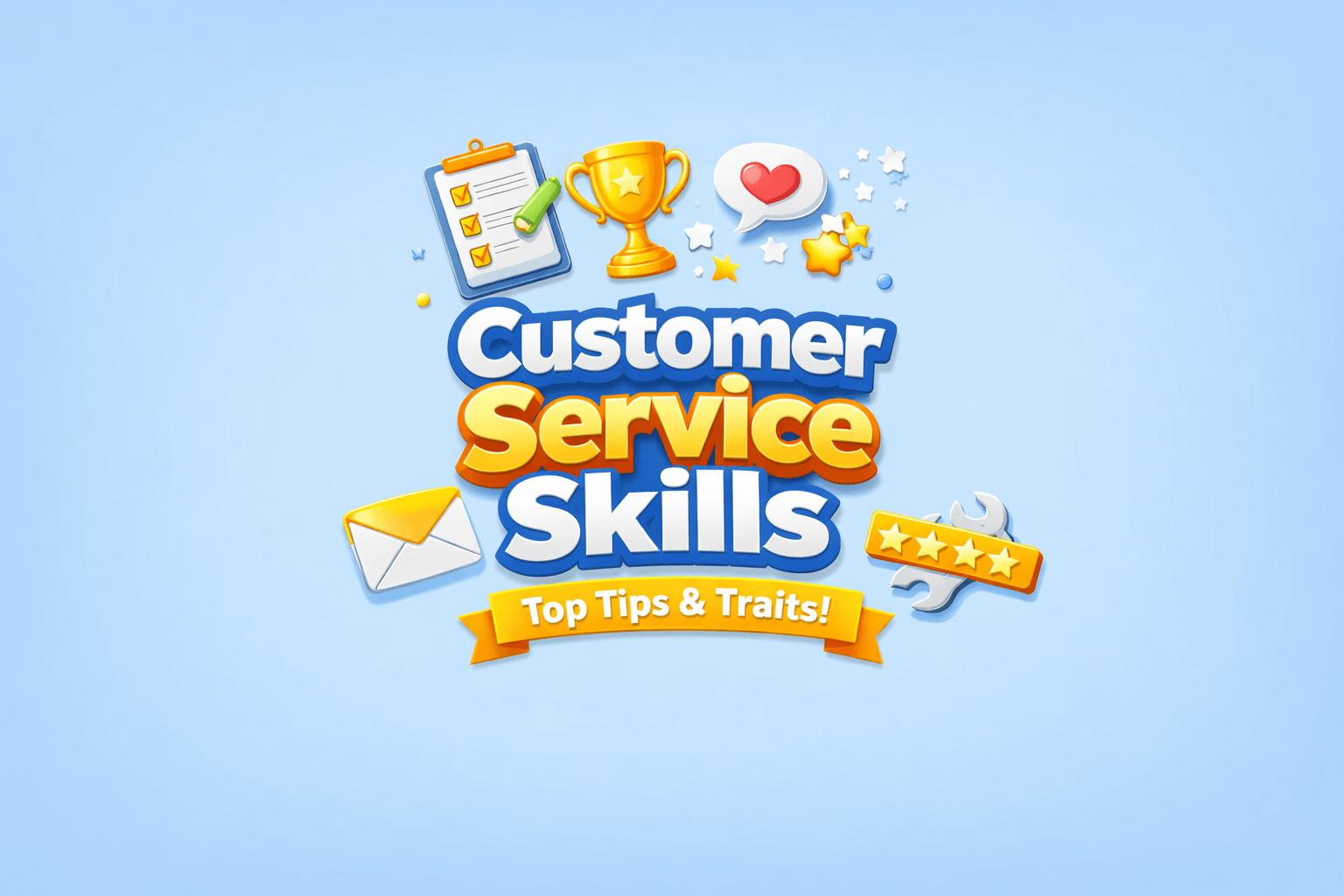Customer Service in Insurance: Best Practices to Win Trust in 2026
- July 30, 2025
- 11 mins read
- Listen

Do you know that slow claims and confusing policies frustrate 60% of insurance customers? Most importantly, it pushes your customers to leave. For businesses, this leads to lost trust and higher churn. Plus, manual processes for repetitive inquiries can eat up 30% of budgets. It’s a real challenge.
So, what’s the solution? AI-driven customer service changes everything. It speeds up claims, offers 24/7 support, and maintains clear communication. In this blog, I’ll take you with me to explore why customer service in insurance is so vital.
And, yes, you’ll discover key elements of great service, learn from top companies, and see future trends.
What is Customer Service in Insurance?
Customer service in insurance is about guiding people through complex policies, processing claims quickly, and building trust with every interaction. At its core, customer service in insurance includes several key touchpoints.
First, it’s being accessible and offering 24/7 support through phone, email, chatbot, or live chat. Next, it involves clear communication, explaining terms in a way anyone can understand. Empathy matters too. Customers want to feel heard. Especially during stressful claims.
For example, a customer filing a home insurance claim after a storm needs fast, caring responses.
And finally, efficiency is critical. Nobody likes waiting weeks for a claim payout. AI-driven customer service tools, like chatbots or mobile apps, help insurers respond faster and simplify processes.
Why Customer Service Matters in the Insurance Industry?
Customer service in insurance is your key to building trust and growing strong. Here’s why it matters to you, whether you’re a customer or an insurer.
- Service builds trust fast: When you face a car crash or a flooded home, customer service in insurance is your lifeline. One bad experience, like a delayed claim, makes 60% of you ready to switch providers. But caring, reliable support keeps you feeling secure. In particular, during tough claims like those after a storm.
- Great service locks in loyalty: Top-notch customer service in insurance makes you stick around; 80% of happy customers renew policies easily. Keeping you costs insurers five times less than finding new customers. Plus, your loyalty saves them from constant turnover headaches.
- Strong service lifts reputation: Stellar customer service in insurance sparks your referrals. On the other hand, poor service triggers complaints, hurting your insurer’s name quickly.
- Good service fuels growth: AI-driven customer service tools speed up your claims and answer questions 24/7, keeping you happy. When you’re satisfied, you refer friends, driving insurer growth.
Key Elements of Exceptional Customer Service in Insurance
Exceptional customer service in insurance makes you feel valued and secure. Here’s what sets the best insurers apart.
Accessibility keeps you connected
You want help anytime, whether it’s midnight or midday. Top-notch customer service in insurance offers 24/7 support through phone, email, or chat. So, you’re never left waiting.
For example, when your car breaks down, a quick call or app message gets you answers fast. It keeps stress low.
Empathy shows you’re heard
When you file a claim after a house fire, you need more than paperwork. You need care. Great customer service in insurance listens closely and responds with kindness.
It makes you feel understood. Insurers who use your name and address your worries personally build trust that lasts.
Speed solves problems quickly
Nobody likes waiting weeks for a claim. Exceptional customer service in insurance processes claims fast, often in days, using AI-driven tools to cut delays.
For instance, you get your payout swiftly after a storm. So you can rebuild without hassle.
Clarity makes things simple
Do you know insurance jargon can confuse you? The best customer service in insurance explains policies and claims in plain words.
So you know exactly what’s covered. Clear answers to your questions, like what your health plan includes, save you time and frustration.
How Insurtech is Transforming Customer Service?

Insurtech revolutionizes customer service in insurance for you. Chatbots and live chat with video calls blend speed with a personal touch.
Chatbots answer you instantly
You may need answers about your policy at 3 a.m., but how to get your questions answered.
In this case, a chatbot is a game-changer. It offers service round-the-clock. These AI-driven tools handle routine questions about claims or coverage in seconds, saving you time.
For example, you ask about deductibles, and a chatbot explains clearly, keeping you stress-free around the clock.
Video chat feels personal
When you’re filing a complex claim, like after a car accident, you want a human connection. Live chat with video calls, powered by REVE Chat, lets you talk face-to-face with an agent for tailored support.
This personal touch makes you feel heard and builds trust instantly.
Seamless handoffs save your time
You start with a chatbot but need more help. Insurtech smoothly transfers you to a video call with an agent; no need to repeat your story.
This blend of instant chatbot responses and live video support ensures customer service in insurance is fast and caring. It always keeps you satisfied.
Smart tools boost your experience
You want service that fits your life. Chatbots use data to suggest policies you need, like home coverage after a move. While video chat agents guide you through tricky decisions.
Together, these insurtech tools make customer service in insurance quick, personal, and hassle-free.
Common Customer Service Challenges in Insurance
Your customers expect seamless customer service in insurance, but key challenges hold your company back. Address these to boost satisfaction and retention.
Complex policies frustrate customers
Your customers struggle with dense jargon in policies, like deductibles or exclusions.
This leads to confusion and dissatisfaction. Unclear documents erode trust and increase inquiries, taxing your support teams.
For example, customers wrestling with health insurance terms often flood your call centers. It highlights the need for simplified communication.
Slow claims erode loyalty
When your customers file claims after incidents like car accidents, delays in processing frustrate them, with 60% considering switching providers after one poor experience.
Manual workflows slow your operations, costing time and trust. Streamlining claims is critical to keep your customers satisfied and loyal.
Limited access strains resources
Your customers demand 24/7 support, but outdated systems or limited digital channels leave them waiting.
Without robust options like mobile apps, you risk losing customers who need urgent help, such as after a storm.
Expanding access is essential to meet modern expectations and reduce churn.
Impersonal service weakens trust
Your customers value personal connections, but generic responses make them feel like numbers.
Without tailored customer service in insurance, like agents addressing specific needs, loyalty drops.
For instance, a customer navigating a home insurance claim expects empathy, not scripted replies, to stay with your brand.
Effective Strategies to Improve Customer Service in Insurance

You can elevate customer service in insurance with proven strategies. Implement these to drive loyalty and cut costs.
Train agents for empathy
Your agents are the face of your brand. Regular training in empathy and clear communication helps them handle claims or inquiries with care. It makes customers feel valued.
For example, workshops on managing home insurance claims can reduce complaints and boost retention.
Use chatbots for instant support
Your customers demand answers anytime. AI-driven chatbots, like those from REVE Chat, resolve policy or claim questions in seconds, easing the load on your staff.
For instance, a customer asking about coverage at midnight gets quick replies, improving their experience.
Offer video chat for personal connection
You know complex issues need a human touch. Live chat with video calls, powered by REVE Chat, lets your agents connect face-to-face.
It builds trust during claims like car accidents. This personal approach keeps customers loyal to your company.
Simplify processes with technology
Your outdated systems slow down claims. AI tools and seamless chatbot-to-video-chat handoffs streamline customer service in insurance, cutting processing times.
For example, automating claim assessments helps you deliver payouts faster. It keeps customers happy.
Gather feedback to improve
Your customers’ insights reveal pain points. Use surveys or TrustPilot reviews to identify issues, like long wait times, and act on them quickly.
Regular feedback loops ensure your customer service in insurance stays aligned with what customers expect.
Invest in digital platforms
Your customers want easy access. Modern mobile apps and user-friendly websites let them manage policies or file claims in minutes.
For instance, a customer updating their auto insurance via an app saves time, boosting satisfaction and your operational efficiency.
Case Studies: How GuardianLife Excelling in Customer Service

Customers at GuardianLife were frustrated by slow responses and impersonal service. Routine inquiries, like policy status checks, overwhelmed agents, while complex claims lacked a human touch, risking 60% churn after poor experiences. Limited 24/7 access and inconsistent replies across channels hurt satisfaction.
Solution
GuardianLife implemented AI-powered chatbots and live chat with video calls via REVE Chat. Chatbots handled routine queries on websites, WhatsApp, and Facebook, while video chats offered personal support for claims.
Features like auto-triggers, seamless handoffs, ticketing, and canned messages ensured fast, consistent, and tailored customer service in insurance.
Results
Your customers now get instant answers, with chatbots resolving 70% of queries, cutting agent workload. Video chats boosted customer satisfaction, especially for health insurance claims.
Seamless handoffs reduced resolution time by 30%, and proactive chats increased lead capture by 25%. Ticketing cuts missed queries and strengthens loyalty.
GuardianLife’s approach shows you how technology transforms customer service in insurance. By blending instant chatbot support with personal video calls, you can reduce costs, improve satisfaction, and grow revenue.
Adopt similar tools to automate operations and keep your customers loyal.
The Future of Customer Service in Insurance
You must prepare for trends shaping customer service in insurance to boost loyalty and growth. Let’s see how top emerging technologies and strategies will redefine your success.
- AI chatbots tackle complex queries: Your customers want instant answers, and advanced chatbots will handle intricate tasks like claim statuses or policy comparisons. By 2026, they could resolve 80% of routine inquiries. It plays a key role in freeing your agents for strategic work. For example, a customer asking about health insurance options gets quick, tailored responses, improving efficiency.
- Video calls strengthen personal trust: You know, claims need a human touch. Live video chats will let your agents connect face-to-face for complex issues, like home insurance claims after storms. This personal approach could increase satisfaction scores by 25%, keeping your customers loyal.
- Omnichannel support ensures consistency: Your customers expect seamless service across platforms. Integrated systems will unify websites, WhatsApp, and social media chats. It enables smooth transitions to agents. For instance, a customer starting on social media moves to a call without repeating details, saving your team time.
- Data tailors personalized experiences: You can leverage analytics to customize service. Predictive tools will suggest policies based on customer data, like auto insurance for new drivers. This personalization strengthens customer service in insurance, boosting retention by meeting individual needs.
- Voice search reshapes access: Your customers will rely on voice assistants more. Optimizing for voice queries, like “check my policy details,” keeps you visible. Voice assistant usage in the US is projected to reach 162.7 million users by 2027. So, adapting now ensures you stay competitive.
- Reviews amplify your reputation: Your brand’s trust depends on feedback. Platforms like TrustPilot will influence 70% of prospects through customer reviews. Delivering great service, like fast claim resolutions, encourages positive feedback, strengthening your market position and growth.
Conclusion
Strong customer service in insurance builds trust, keeps customers, and boosts your bottom line. You’ve seen how empathy, speed, and clarity address challenges like complex policies and slow claims.
Leading insurers, like GuardianLife, use chatbots and video calls to deliver instant and personal support, setting a benchmark for excellence. Looking ahead, AI, omnichannel platforms, and voice search will shape the future, helping you meet customer expectations.
To stay competitive, invest in training, streamline processes, and leverage technology for seamless experiences. For example, integrating digital tools can cut resolution times by 30%, saving costs and retaining customers.
Now’s the time to act. Review your customer service strategies, adopt smart tools, and prioritize feedback to ensure your company thrives in 2026.
Want to take the next step? Try REVE Chat Free today and take the most important decision to take your customer service to a new height.
Frequently Asked Questions
Customer service in insurance involves guiding customers through policies, claims, and inquiries with clarity and care.
You ensure accessibility, empathy, and speed to build trust. For example, quick claim responses keep customers satisfied.
Strong customer service in insurance drives loyalty and reduces churn, with 80% of happy customers renewing policies.
It saves you costs, as retaining customers is five times cheaper than acquiring new ones. Poor service risks losing 60% of customers after one bad experience.
You can tackle issues like slow claims by using AI tools and training agents for empathy. Streamlined processes and 24/7 digital access cut delays.
For instance, automated systems reduce claim processing times, thereby boosting customer satisfaction.
AI chatbots and video chats enhance customer service in the insurance industry by offering instant and personalized support.
Analytics tailors experiences to customer needs. These tools help you resolve queries faster and increase retention.
You track metrics like customer satisfaction scores (CSAT) and resolution times to gauge success.
Surveys and TrustPilot reviews reveal customer sentiment. High CSAT, like a 20% boost, signals effective service strategies.




